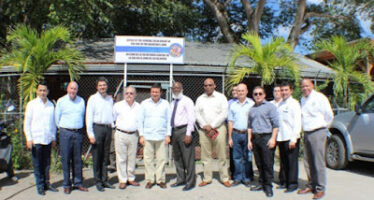Italy: Act Swiftly to End Racist Violence
![]()
Authorities Should Acknowledge Problem, Ensure Prosecutions

© 2010 Getty Images
(Rome) – The Italian government is failing to take effective action to prevent and prosecute racist and xenophobic violence, Human Rights Watch said in a report released today. Immigrants, Italians of foreign descent, and Roma have been the victims of brutal attacks in Italy in recent years. The 71-page report, “Everyday Intolerance: Racist and Xenophobic Violence in Italy,” documents the state’s failure to take effective measures against hate crimes. Prosecutions for racially-motivated violence are rare, with Italian officials downplaying the extent of the problem and failing consistently to condemn attacks. Insufficient training of law enforcement and judiciary personnel and incomplete data collection compound the problem. At the same time, political rhetoric, government policies, and media coverage linking immigrants and Roma to crime have fueled an environment of intolerance. “The government spends far more energy blaming migrants and Roma for Italy’s problems than it does on efforts to stop violent attacks on them,” said Judith Sunderland, senior Western Europe researcher at Human Rights Watch. “The government’s alarmist talk of an invasion of ‘biblical proportions’ from North Africa is just the latest example of irresponsible rhetoric. Officials should be protecting migrants and Roma from attack.”
Cities across Italy have seen mob violence and individual attacks targeting migrants, Roma, and Italians of foreign descent. Mobs rampaged through Roma camps in Naples in May 2008 and assaulted African seasonal migrant workers in Rosarno, Calabria, in January 2010. A group of at least 15 people attacked a Bengali bar in Rome in March 2010.
Authorities recorded 142 hate crimes in the first nine months of 2009, but one Italian anti-racism organization registered 398 media reports of such crimes in roughly the same period, with 186 physical assaults (18 of which led to death).
Individual attacks include the September 2008 murder of Abdoul Guiebre, an Italian of Burkina Faso origin bludgeoned to death on the street in Milan after a petty theft from a café; the brutal beating of a Chinese man in October 2008 as he waited for a bus in Rome; and the February 2009 attack on an Indian man in a town outside Rome, in which he was beaten, doused with gasoline, and set on fire.
Human Rights Watch also documented troubling cases of law enforcement abuse against Roma, during camp evictions and in the custody of police or Carabinieri (a Defense Ministry force that shares responsibility for civilian policing in Italy).
Italian law provides for increased prison sentences for crimes aggravated by racial motivation, but the statute has yet to live up to its promise, Human Rights Watch said. The 1993 statute has often been interpreted by prosecutors and the courts only to apply to cases where racial hatred was the sole motivation, leaving serious racist crimes prosecuted as though they were ordinary offences. The state prosecuted Abdoul Guiebre’s murder as an ordinary crime, for example, despite the racist insults uttered by the perpetrators during the attack. Crimes motivated by hatred over sexual orientation and gender identity are not covered at all.
The extreme violence against African seasonal migrant workers in Rosarno, Calabria, in January 2010, including drive-by shootings and three days of mob violence that left at least 11 migrants hospitalized with serious injuries, did not lead to prosecutions and convictions for racially-motivated crimes. Only three Italians were prosecuted and convicted in connection with the violence. Local residents and law enforcement officers also suffered injuries, some of them caused by migrants during riots against the mob attacks.
Italian officials minimized the racist dimension of the violence in Rosarno, in keeping with a general tendency to call racially-motivated crimes rare. The Italian government does not collect or publish disaggregated statistics on crime reports or prosecutions. Authorities point to the low numbers of official complaints and prosecutions for racially motivated violence to argue that such violence is rare, ignoring underreporting and the failure of the authorities to correctly identify it.
“The Italian government likes to pretend that racist violence hardly ever happens,” said Sunderland. “But if you are an Italian from an ethnic minority, Roma, or a migrant, the truth is it’s all too common. Acknowledging the scale of the problem is a necessary condition for tackling it.”
A consequence of the authorities’ failure to recognize these hate crimes as a significant problem is that law enforcement personnel and prosecutors do not receive systematic, specialized training in identifying, investigating, and prosecuting racist violence.
Roma, the most vilified minority in Italy today, are especially at risk of harassment and mistreatment during camp evictions and in police or Carabinieri custody, Human Rights Watch said. With serious allegations of abuse by law enforcement personnel left uninvestigated, and virtual impunity for mob violence against Roma camps, many Roma have little or no faith in public institutions.
“Many people, especially undocumented migrants and Roma, are just too scared to go the police,” Sunderland said. “The government has to do much more to encourage reporting and build trust among these particularly vulnerable communities.” Political discourse and media coverage linking immigrants and Roma to crime has fueled a dangerous environment of intolerance in a country that has seen a dramatic increase in immigration over the past 10 years.
Since 2008, the government of Prime Minister Silvio Berlusconi, in coalition with the openly anti-immigrant Northern League party, has adopted “emergency” decrees to pave the way for strong-handed measures against undocumented migrants and Roma, and passed a law making undocumented entry and stay in Italy a crime punishable by a hefty fine. Elected officials across the political spectrum have engaged in anti-immigrant and anti-Roma rhetoric.
This Human Rights Watch report contains concrete recommendations to the Italian government to strengthen its response to racist violence, including:
- Consistently and forcefully condemning, at the highest level, racist and xenophobic violence.
- Reforming criminal law to ensure that hate motivation can be applied even when perpetrators have mixed motives, and expanding the list of protected characteristics to include, at a minimum, sexual orientation and gender identity.
- Ensuring obligatory training for law enforcement personnel and public prosecutors on detecting, investigating, and prosecuting crimes motivated wholly or in part by racial, ethnic, or xenophobic bias.
- Collecting and routinely publishing comprehensive statistics on hate crimes.
Related Articles
A propósito de la nueva declaración del “Grupo de Lima” contra las actuales autoridades de Venezuela
![]()
De cara a la toma de posesión del actual Presidente Nicolás Maduro en Venezuela por un nuevo mandato, a celebrarse este próximo 10 de enero, el denominado “Grupo de Lima” adoptó una nueva declaración suscrita por 13 Estados
Chile, un país de vasallos
![]()
/ Agencia Uno A medida que desciende por la escala de la desigualdad usted puede tener la certeza de que
Guatemala / Belice: Corte Internacional de Justicia anuncia inicio de procedimiento
![]()
a Corte Internacional de Justicia (CIJ) ha anunciado que fue solicitada por ambos Estados, Guatemala y Belice para examinar el diferendo territorial que persiste desde la proclamación de independencia de Belice en 1981




